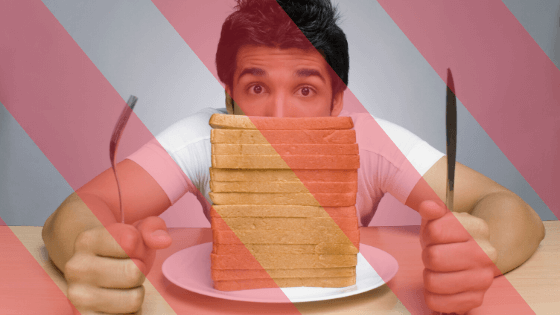"I know I need to eat healthily, but sometimes I just can't help myself and reach for the biscuit tin." Sound familiar? I'm sure everyone knows that sweet treats like cake, cookies & biscuits, ice cream and lollies don't provide good nutrition for your body. Why then, do they continue to prove so popular? If you can learn to control hunger cravings, you can break the cycle. How is it sweets are such a common sticking point when it comes to weight management and people eating for health?
More...
Why? It’s simple – sweet things taste good. They stimulate the reward centres in our brain. Gym junkies, athletes, everyone actually who allow themselves to get too hungry tend to crave sweets.
Most people believe it’s the sweet treats that are the problem. I don’t think that’s strictly true.
The sweet treats are the symptom – becoming too hungry is the problem.
When you get too hungry, your blood sugar levels drop. Your brain senses this and sends out strong signals that you need to eat. It needs to raise your blood sugar back up and wants you to do it quickly. It can become impossible to ignore the temptation at this point because your brain is encouraging you to reach for the snacks. The pastries, the cookies, the cakes, the lollies.
Hunger – your body’s request to top up the fuel tank
Hunger is an extremely basic, yet very powerful, physiological signal produced by your body. It creates a strong desire to eat. As a child, when you complained about being hungry, your parents would quickly provide you with food. As an adult though, we either have “no time to eat” or if we’re conscious about lowering our body fat levels, we might think it’s better not to eat. Sometimes we might link eating to getting fat.
People to train hard – gym-goers and athletes, eat without getting fat. The food they consume is fuelling their muscles for their regular workouts. Problems come up when people become rushed, stressed or are “on a diet” and so don’t take in adequate fuel. Feeling hungry can become normal.
Technically, your body is in starvation.
‘Starvation’ and ‘on a diet’ basically mean the same thing. We might think of starvation as only a problem in third world countries who are in the grips of famine. Real starvation, however, from a physiological standpoint, is common among busy people, regular gym-goers and dieting athletes.
What we know about starvation and restrictive diets
A 1950s study into the physiology of starvation provided some interesting insights. The University of Minnesota carefully monitored 36 young, healthy, psychologically normal men for 6 months. These men were restricted to eating only half of their normal dietary intake. The researchers had already carefully observed each person’s behaviour, personality, habits and eating patterns for 3 months before the diet phase started. The researchers continued to observe the participants for between 3 and 9 months after the diet had ended. They wanted to study what also happened during refeeding.
It turned out that many symptoms associated with ‘binge eating’ were actually due to starvation. As the men’s weight dropped, they thought about food all the time. Their thoughts became preoccupied with food, eating and meals. It turns out the men were talking about food, reading about it, collecting recipes and even dreaming about eating. All were frequently drinking more tea and coffee as well as chewing more gum.
Psychologically, the men became depressed. They were experiencing severe mood swings, anger, anxiety and were extremely irritable. The researches noted their sense of humour had dwindled and the men were becoming withdrawn.
Physically, the men felt weak, dizzy and had cold hands and feet. Some were unable to keep control when it came to food. Binge eating, if the opportunity came up, was excessive.
Interestingly, after the study ended and the men were able to eat freely, many of them ate continuously. They were choosing big meals and still having snacks afterwards. They ate and ate.
What we learned about calorie restriction and dieting too hard
Although conducted around 70 years ago, there are still 3 main learnings from this study that are important today:
- Becoming preoccupied with sweet treats and snacks indicates your body has become too hungry. Hunger signals create a very strong drive to eat.
- Binges tend to stem from starvation. If you find it difficult to stop eating once you start, you’ve likely become too hungry. This can also be the case if you are under extreme stress.
- If on a diet that allows too few calories each day, you’re likely to blow out. You’ll consume sweets and cakes to become less hungry and provide the energy that your body needs.
How to control hunger
Today, in our busier and more stressful lives, people often live in hunger. We tell ourselves “I don’t have time to eat” or “if I eat this, I’ll get fat.” Even athletes and generally ‘fit’ people think the best way to lose weight is to severely restrict their calorie intake. They don’t allow themselves the opportunity to eat cakes, cookies and other tasty treats. The only time they get to eat them is when they blow their diet and turn into the cookie monster.
There is another way though:
- Avoid becoming too hungry in the first place by eating enough at mealtimes. Aim to lose weight by eating 10-20% fewer calories, not 50%.
- Enjoy a treat now and then as part of an overall healthy meal plan.
- Ensure your body’s calorie needs are balanced with your training program and activity levels.
Take back control of your diet and your appetite
The next time you do find yourself overwhelmed with the urge to binge, use food labels to help. Calculate your day’s calorie intake so far. You’ll likely see a huge discrepancy between how much you’ve eaten and what your body needs. It should then come as no surprise why you’re craving the sweets, chocolate and cake.
Once you realise how powerful hunger is and how much control it can have over you, it becomes easier to take steps to prevent it. You’ll know how and what to eat before you get too hungry.
You might already have a plan that works for you and know what and how much you need to eat each day. If you don’t, as an accredited sports nutritionist, I can help you with all of this. We can work together to come up with a tailored diet plan that works for you and your current lifestyle. Feel free to get in touch and begin a no-obligation discussion.

Living with temptation and learning to control hunger cravings
What if you already know you can’t live without cakes, chocolate, doughnuts or sweets? If you find you have trouble stopping eating them once you start, they have power over you.
Take their power away.
The way to do this is to eat them more often, in appropriate portions. Incorporate them into a nutritionally well-balanced meal plan or diet. Don’t try to avoid them altogether.
Compare that slice of cake to an apple. Apples probably don’t have any power or control over you because you allow yourself to eat an apple any time you like. Cake, on the other hand, will have power if you regularly ban it.
Maybe if you enjoyed a sensible treat with every lunch, you’ll start to desire fewer treats. They’ll lose their appeal and you’ll have won the hunger battle once and for all.
Want to know more about how you can control hunger and sort out your diet?
Consider a customised meal plan and nutrition program. As a nationally accredited Sports Nutritionist and Personal Trainer, I can work with you can coach you through small changes that will have big results. Take the first step and reach out to me and see what I can do for you.

